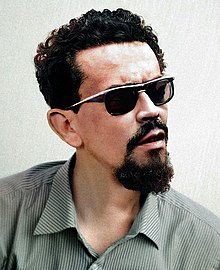Carlos Fonseca
Carlos Alberto Fonseca Amador (born June 23, 1936 in Matagalpa , † November 8, 1976 in the mountainous regions of Nicaragua ) was one of the founders of the Nicaraguan liberation front Frente Sandinista de Liberación Nacional (FSLN) .
Life
Carlos Alberto Fonseca Amador was born in Matagalpa as the son of the unmarried farm worker Augustina Fonseca Ubeda. His father, Fausto Amador Aleman, a member of the influential Amador coffee-growing dynasty, did not initially confirm paternity, but later enabled his son to get a good education.
Carlos Fonseca grew up with his hardworking mother selling newspapers before and after classes. From 1950 Fonseca joined various political groups; soon he became enthusiastic about Marxism . In 1955 he began to study law at the University of Managua .
After the assassination of President Anastasio Somoza García on September 29, 1956, Fonseca was imprisoned for two months. In 1957 he traveled as a delegate to the VI. World Festival of Youth and Students in Moscow and then stayed for six months in the Soviet Union and Eastern Europe. During this time he is said to have been recruited by the KGB . Upon his return to Nicaragua, Fonseca illegally published his travel record glorifying life in the Soviet Union.
In February 1959 Fonseca visited Cuba and met Fidel Castro there. A little later, Fonseca was in a training camp for Nicaraguan rebels in southern Honduras . On June 24, 1959, these rebels were defeated by Nicaraguan and Honduran troops and Carlos Fonseca was captured.
After his release, Fonseca founded the Frente Sandinista de Liberación Nacional (FSLN) on July 23, 1961. He confessed himself to be an ardent supporter of the Cuban revolution and led two armed actions against the Somoza regime in 1963 and 1964, which failed after a few days. Fonseca took over the office of General Secretary of the FSLN in 1966 and in 1968 called on the students to fight the dictator Anastasio Somoza Debayle . A year later he campaigned for the unity of all oppositional forces, primarily for an alliance of workers, peasants, agricultural workers and the middle classes.
Carlos Alberto Fonseca Amador was arrested in Costa Rica in 1969 and remained imprisoned until he was liberated by a Sandinista squad in 1971. He went to Cuba and did not return illegally to Nicaragua until September 1975. On November 8, 1976, Carlos Fonseca fell as the commander of a military division of the FSLN in the mountainous regions of Nicaragua in the fight against Somoza's National Guard .
Due to his poor eyesight, Fonseca had to wear thick glasses as a child. Later these glasses became his "trademark".
literature
- Carlos Fonseca: Under the flags of Sandino. Selected writings . Edition Marxistische Blätter, Düsseldorf 1988. ISBN 3-88501-070-4
- Werner Mackenbach: Carlos Fonseca and Sandinism. Study of the context of his thoughts and their significance for the construction of the Nicaraguan nation . dipa-Verlag, Frankfurt am Main 1995. ISBN 3-7638-0349-1
Web links
- Literature by and about Carlos Fonseca in the catalog of the German National Library
| personal data | |
|---|---|
| SURNAME | Fonseca, Carlos |
| ALTERNATIVE NAMES | Fonseca Amador, Carlos Alberto (full name) |
| BRIEF DESCRIPTION | Nicaraguan revolutionary, founder of the Nicaraguan Liberation Front FSLN |
| BIRTH DATE | June 23, 1936 |
| PLACE OF BIRTH | Matagalpa , Nicaragua |
| DATE OF DEATH | November 8, 1976 |
| Place of death | Nicaragua |
